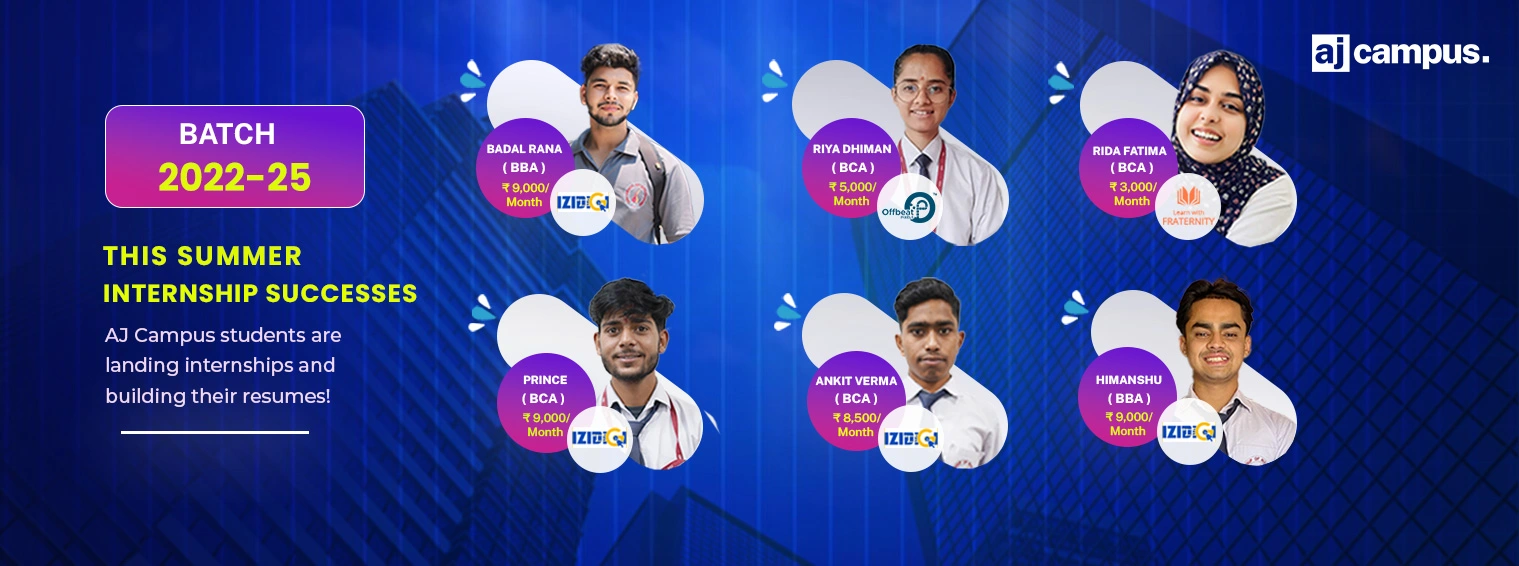







Admissions open for session 2024-25 Apply Now

100%
Placement Assistance*

8 +
Specializations Offered

0%
Tuition Fees*

10+
Months of Internship

Welcome to India's top Pay after Placement campus chain – where dreams come true! No need to worry about upfront costs; we are not just a campus chain, but also your partners in achieving success. Now is the time to begin your incredible journey, where learning and opportunities combine to shape your success. Are you prepared to turn your career into an adventure? Let’s rock it together!
Explore all `

Exciting news! The AJ Campus is expanding quickly, with campuses in Dehradun growing and new locations opening up. Keep an eye out for updates on the new additions to our campus community!
Explore a wealth of knowledge, perspectives, and insightful information within our selective collection of articles. Made for students to clarify their uncertainties and choose what is best for them.
Learn from our top Gurus with over 15 years of experience.

Suvendu Barai
Investment Banker, Ex DBS Bank, ICICI Bank

Debapratim Dey
IIM Indore, 20+ yrs of Coprarate experience in leadership

Janmejaya Pradhan
Ex. Corporate, Ex. Leagal & Compliance at Cognizant, Dubai

Abigel Lamely
CELTA Trained, (Cambridge) Ebglish & other language course Expert

Karlton Lamely
Personality Development Expert

Riju Shrivastava
Ex Myntra India, Omnicom Group

Sohan Singh
Software Engineer & Tech Trainer

Sachin Agarwal
Ex. HDFC Bank, Ex Amity Unversity
| Features | Other Universities & Colleges | AJ Campus |
|---|---|---|
| Batch Size | Large Batches | Limited class sizes ensure that each student receives individualized attention |
| Class Durations | Regular Classes | Extra classes cover interview preparation, group discussions, and psychometric evaluation. |
| Faculty Experience | Experienced Faculty | Versatile Faculty Experts with Extensive Experience |
| Growth Tracking | Track Record of Growth and Improvement | AI and machine learning platform to track growth and progress |
| Placement Rate | Average placement rate | Impressive 92.3% placement rate |
| Study Material | Study Material and Notes | Cutting-edge learning resources include practice materials and mock tests |
Alright, let’s get real about payments at AJ Campus! Our ‘Payment Model’ is all about simplicity and choices.
Invest in your education with confidence, paying after you land your dream job.
Our commitment to your satisfaction – a safety net ensuring your investment matches your expectations.
Get Details Apply NowKeep it simple with a straightforward and hassle-free payment plan.
Get Detail Apply Now
Take a peek into ‘Our Success Stories’ at AJ Campus – it’s where the magic happens! From landing awesome gigs to personal victories, our students are rocking it. Ready for a dose of inspiration? Your success story might just be the next star of the show!
Enquire NowPerhaps you’re asking yourself, “So What is Freelancing?” Working for yourself instead of being employed by someone else is known as freelancing. Freelancers, often known as independent contractors, are self-employed individuals.
Other businesses engage freelancers on a temporary or part-time basis, although they are not as dedicated to any one organization or paid as full-time employees.
In the 1800s, a “free lance” was a mediaeval mercenary who would fight for whichever country or someone paid them the most. This is when the name “freelance” first appeared. For example, in jousting, knights would use a long weapon called a “lance” to knock opponents off their horses.
Freelancers take payments in exchange for rendering services. Usually, that agreement is temporary or part-time. For instance, if I paid a freelancer to take new headshots for me, I might stop there.
Freelancers are occasionally compensated for a predetermined number of hours per week or month. The term “retainer” is frequently used to describe that arrangement.
When you keep someone’s services or time, it’s called a retainer. A large number of solicitors practice on retainer. Regardless of whether that complete time is utilized or not, they charge the client a certain amount of time each month.
It’s actually one of the most straightforward and unadulterated types of entrepreneurship: the freelancer offers a certain good or service, and the client pay them directly.
Knowing that the term “freelance” refers to self-employed job is crucial to understanding what it means. Professionals with specialized skill sets may work as independent contractors for other people or businesses. Instead of working as an employee of another business, the freelancer under this arrangement operates as an independent contractor. In order to achieve their financial, professional, and personal objectives, freelancers may decide to take on additional clients as needed.
By offering clients an estimate for a full project or setting up an hourly rate, businesses also decide how much they charge for particular services. They might decide to be paid on a regular basis or at the start or finish of a project. Because they like having complete control over their work schedule, project selection, and pricing, many professionals opt to work as full-time freelancers. To augment their primary income and work on projects they are enthusiastic about, other professionals could decide to work as part-time freelancers.

Individuals who freelance have a great deal of flexibility and control. The majority of independent contractors set their own schedules, selects their own projects, choose which customers they engage with, and sometimes even work from home.
As a type of entrepreneurship, freelancing gives the freelancer complete control over their earning potential. Since freelancers are not bound by a set salary, they are free to charge their clients as much as they can make.
And as a freelancer, you are your own boss. You can do a lot of different kinds of job when you freelance. Freelancing might allow you to experiment with a wide range of projects and businesses if you have a lot of interests and are an adventurous person.
Freelancing isn’t something that people usually do for a living. They either design their own products to replace their freelancing revenue, hire more employees or freelancers to build a full agency, or return to full-time employment. Many people find that freelancing gives them the flexibility they need to decide on their future professional path.
There are some health and financial concerns associated with freelancing.
One of the main advantages of working a full-time job in the US is having access to healthcare and other financial perks beyond your regular pay. This could include health insurance offered by the business or a 401(k) retirement plan.
Employers typically won’t offer freelancers the same financial or health benefits if they recruit them as independent contractors. Therefore, when it comes to making financial plans and getting health insurance, independent contractors are on their own.
Freelancers are somewhat at a disadvantage in addition to being on their own to arrange these perks for themselves. Because they are purchasing in bulk, a firm can frequently obtain better rates when negotiating health insurance coverage with a broker. As a self-employed person, however, you are purchasing insurance just for your family and yourself.
And regrettably, that could result in higher health insurance premiums. Setting up your own retirement savings account is simple, but your company won’t match any of your payments.
Lastly, freelancers have full responsibility for all revenue received by the company. Your revenue will stop coming in if you are unable or unwilling to sell more projects and acquire more clients.
All of these hazards are controllable, but before you start working as a freelancer full-time, you should think about them.

The following actions will assist you in making money as a freelancer:
Since you can focus only on one topic to offer quality services to the clients, it is possible to narrow down to just one topic. For instance, if you have years of professional experience in project management, you can work as a freelance project manager for different agencies. If the agencies are satisfied with what you’ve done for them, they will recommend you to other clients, and the chances of having a consistent workload and income are more likely the more clients you are working with.
To choose the clientele you wish to work with, consider your prior job experience. Promote yourself as an employee of small firms if you have experience working with them. Potential customers want to collaborate with someone who is aware of their particular difficulties.
Next, decide on project and hourly prices for the services you offer. Customers have the option of paying you at those rates or a retainer charge in exchange for your services. If you’re starting out as a freelancer, start with lesser fees so you can concentrate on meeting deadlines and cultivating customer connections. As you become more skilled and confident in the work you’re doing, you can charge more for your services. To improve your reputation as a freelancer and your pay rate from prospective clients, ask your existing clients to provide testimonials.
Make a portfolio website to showcase your clients and completed projects. To demonstrate your results, list your greatest achievements since you started freelancing. Add a “about me” page where you can discuss your background, passions, and location. Provide your contact details so that potential customers can get in touch with you if they’re interested in your offerings.
A career as a freelancer has advantages and disadvantages, regardless of fit or type of job.
You are in charge: You decide what clients or assignments you wish to take on, as well as your fees and timetable. You can work in your pajamas if you want to. It is entirely up to you whether or not you want to take a three-week vacation.
Taxes could be reduced: More tax deductions for travel, meals, and other expenses are available to freelancers. Not every pay cheque has federal and state taxes deducted from it. Instead, freelancers pay the IRS directly.
You are able to earn more money: There is a high risk and a big payoff to freelancing. You can choose how much you want to get paid. It all depends on how frequently you want to work and how much you charge.
Your work-life balance is better: You don’t have to commute every day; you can go to your neighborhood coffee shop or work out for an hour whenever you’d like. It’s not necessary for freelancing to look like a regular 9–5 job.
Entrepreneurship Opportunities: Starting a business and eventually becoming an entrepreneur can be accomplished through freelancing. Freelancers can acquire abilities that will assist them develop their own businesses and attract clients. Entrepreneurs can create a profitable firm by applying their business acumen.
You are in charge: I did say this twice, yes. You have to handle every choice and task when working as a freelancer, from finding clients to promoting your business. You are the company, not merely one of its employees.
You are responsible for handling your own bookkeeping, taxes, and benefits: Employers do not have to handle bookkeeping, cash flow, taxes, or benefits for freelancers. They must perform it on their own with the aid of instruments or manuals. Additionally, some of these costs—such as health insurance—are more costly than they would be through a conventional job. You cannot earn money if you do not work. Yes, you can take a three-week vacation, but during that time you might not earn any money.
Your time is money if you’re a freelancer. If you spend it carelessly, you can be forfeiting important revenue.
You may lose your work-life balance due to instability: Where your next pay cheque may come from is one of the many unknowns that come with freelancing. Any work-life balance attained by freelancing may be negated by this unpredictability. For some people, a long commute or an unfavorable schedule is worth it if their employment is stable and predictable.
Flexibility, independence, and financial opportunity are the main drivers of freelancing. Predictability of income, employment, and benefits are the main obstacles.

Although freelancing allows for flexibility and independence, it also requires certain abilities and characteristics to succeed in a cutthroat market. These traits can make a big impact in your freelance work, whether you’re just starting out or hoping to advance.
Building and sustaining client relationships requires professional and transparent communication. Effective communication helps prevent misconceptions while discussing project details or negotiating conditions. One way to make sure everyone is in agreement is to write down the project requirements after a call.
Freelancers have to adjust to various customer requirements, job types, and sectors. You can become more adaptable and appealing to clients by being willing to change your working style or pick up new abilities. For example, taking online classes to stay current on industry trends will help you stay ahead of the competition.
Freelancers face a variety of unforeseen difficulties, such as last-minute customer changes and technical difficulties. Finding fast, workable answers and maintaining composure under duress are hallmarks of a skilled problem-solver. For instance, having a contingency plan, such as a different internet supplier, can help avoid task delivery delays.
For freelancers to stay productive and achieve deadlines, they need to be self-motivated. You must establish and follow your own timetable if you don’t have a manager to supervise your work. You can stay organized and finish assignments on schedule by creating a daily to-do list.
Effective time management is essential while working on several projects at once. Setting priorities is crucial for freelancers because they frequently deal with a variety of clients and deadlines. Google Calendar and other similar tools can help you plan your workday and make sure you don’t miss any deadlines.
Since income as a freelancer might fluctuate, financial management is essential. Both personal and corporate expenses, such as taxes or software subscriptions, must be budgeted for. You may track your income and expenses and be ready for tax season by using Excel sheets or expense tracking applications.
Making connections developing a strong network is crucial to expanding your freelance business and acquiring new clients. Participate in industry-related social media groups, online forums, or industry events. These relationships may result in future joint ventures and employment opportunities.

The following advice can help you succeed as a freelancer:
Start when you’re employed full-time: Start doing freelance work when you have a full-time job to determine if you can complete tasks successfully and earn money. Examine the client’s comments and your revenue to see if you can make a living on your own.
Develop your abilities: Get certifications to master new skills linked to your profession. You can improve the caliber of your work and the kinds of projects you work on by concentrating on developing your skills. An online editing course can be taken by a freelance writer, who can then work on editing tasks after finishing the course.
Recognize when to decline certain tasks: Give clients time that will increase your revenue and freelance reputation. Reject assignments that are outside of your area of expertise or if you would want to devote more time to other clients.
Being self-employed entails being your own boss. Whether you want to work directly with clients, subcontract, or use a jobs marketplace and freelancing websites like fiverr, upwork etc, it is your responsibility to find a means to occupy your time with paid employment.
More businesses than ever before are hiring freelancers, and there are dozens upon dozens of various kinds of Freelancing work. There are trade-offs in terms of financial and health benefits, but freelancing may be a fantastic way to make a career on your own terms.
Freelancing is essentially a type of self-employment. Since you don’t work primarily for one company as a freelancer, you can reside anywhere there is a dependable internet connection. You are in charge of who you work for and when you work.
Other difficulties include irregular work schedules, unpredictable workloads, and payment delays. However, because of its advantages, freelancing can be a fruitful and satisfying employment choice. You’ll need both personal and practical talents to get through the challenging terrain.
Here are some points on How to start freelancing:
1. Describe your offering and service.
2. Determine who your target audience is.
3. Create a price plan.
4. Create a stunning portfolio.
5. Compose a fantastic proposal.
6. Build a rapport with your customer.
7. Keep improving your abilities.
8. Connect with other independent contractors.
Even though most customers are reliable and will make their payments on schedule, you should nonetheless exercise caution. Before you begin working, make sure you have a written agreement on the deliverables, pricing, and terms of payment, even if you don’t have a formal contract in place.
The most popular professions for freelancers include marketing, web development, graphic design, and writing. Anything artistic and talented really. However, since so many occupations are now done remotely, the idea of freelancing has grown significantly. There are many website for freelancing that one can visit to kick start their career.

Digital marketing is the practice of using websites, applications, mobile devices, social media, search engines, and other digital tools to promote and sell products or services.
Digital marketing is considered as just another channel by many business houses to communicate and know more about customers’ behavior and embraces most of the traditional principles of marketing. Businesses often combine offline and online marketing strategies. Nonetheless, internet marketing has some distinct issues associated with it. When the internet started gaining mass acceptance in the 1990s, digital marketing gained momentum.
Businesses may employ several strategies and channels to grow their market reach and promote their wares to interested buyers. It is a synthesis of sales and advertising acumen to make it work. Such work is done by professional marketers, either in-house at select firms or outside at marketing agencies that might serve a variety of customers.
Where previously, companies relied on print, radio, and television for marketing, the internet gave companies a new channel to access customers and brought up the now popular digital marketing, even though these alternatives are still available.
The emergent of the technologies and trends forced companies to reassess their marketing activities and budgets. In early stages of digital marketing, the use of email became a very dominant mode of marketing.
This evolved into targeting search engines like Netscape, where firms could emphasize and keyword products to become more visible. The arrival of social media tools such as Facebook enabled companies to track user data and address very specific groups directly in their messaging.
Since the 1990s; digital marketing channels have been changing and are still evolving. There are eight of the most commonly used channels available now.
Website Marketing
Most businesses focus their online marketing efforts on their own website. A well-designed and functional website is often the first good impression a company makes, both for itself and its offerings. Today’s site also needs to be fast, to load quickly on various devices, and easy to use.
Pay-Per-Click Advertising
The PPC ads enable marketers to reach their target audiences on news and other websites besides the other digital platforms. Advertisers can put up their PPC campaigns on Facebook, LinkedIn, X formerly Twitter, Google, Bing, Pinterest among others, and their ads will find their way to the users who will type in phrases related to their product or services.
These campaigns allow them to be segmented based on their geography, interests, or even a few demographics for example: age or gender. The two most important PPC services are Facebook Ads and Google Ads.
Content Marketing
The main goal of content marketing is to reach potential consumers through interesting written, visual, or video information. This information, once published on a website, gets pushed through email marketing, social media, search engine optimization, and even pay-per-click advertising. While content marketing will be less overt than advertising, the sponsor’s intended product or service may not be very high profile.
Email Marketing
Despite the misconception that it is spam emails, email marketing remains one of the most successful digital platforms. To source names for their email lists, many digital marketers utilize some of the different digital channels they are employing. They then try to turn such leads into customers through email marketing.
Social Media Marketing
At the same time, trust and brand awareness are the primary goals of any social media marketing campaign. The more you experience social media marketing, the more likely you are to use it as a direct marketing or sales channel and to create leads. Two examples of social media marketing are tweets and promoted posts.
Affiliate Marketing
One of the earliest forms of advertising is affiliate marketing, now reinvigorated by the internet age. Affiliate marketing involves third-party parties-both businesses and individuals referred to herein as private “influencers”-promoting other persons’ or entities’ products in hopes of receiving a commission each and every time a lead results from the efforts, or a sale is made.
Many big businesses, for instance, Amazon, provide an affiliate program that pays affiliates involved in selling their products millions of dollars.
Video Marketing
Many internet users log onto websites like YouTube to view relaxing material, how-to clips, reviews, and other things before purchasing. To start a video marketing campaign, marketers can leverage almost any of a variety of platforms they have at their disposal, including Facebook Videos, Instagram, and YouTube. Businesses who extend video by combining it with SEO, content marketing, and more in-depth social media marketing activities achieve the best results with it.
Text Messaging
Businesses also use texting, also referred to as SMS or short message service-to inform customers of their new products and promotions. Texting is yet another platform whereby politicians and non-profits apply to raise funds and market. In the current world, most marketing programs accept consumers to give or pay via text message.

You could reach the best customers who are liable to buy your good or service with digital marketing and may reach a wider audience than you could with old methods of advertising. It is also often less costly than traditional advertising, and you can make all the necessary adjustments and monitor results each day.
Target your marketing to the most probable customer to buy your good or service.
You can also locate and reach a very niche audience with tailor-made and highly impactful marketing messages using digital marketing.
For instance, social media targeting allows an advertiser to display an ad to certain people based on their age, sex, location, interests, connections, or other behaviors specified.
Or you may sell advertising to those actively searching for, or who have expressed interest in, specific keywords relevant to your business, service, or industry, using a pay-per-click or search engine optimization strategy.
Digital marketing ultimately lets you research to help define your consumer personas and hone your strategy so you reach prospects that are most likely to become customers.
It is less expensive compared to other traditional outbound marketing measures.
Using digital marketing, you can monitor day to day effectiveness of your campaigns and therefore know what channels are working and which aren’t. You can maximize your ROI with this information.
You may be constantly making adjustments with a digital marketing plan and which makes sure you never waste your money on the wrong channels.
For example, if your business is just a start-up with little or no budget for marketing, you can well find a worthwhile investment in blogging, social networking, or SEO-these three being tactics that can bring out significant returns on investment even with a small amount of investment.
With online marketing, you get to compete equally with larger brands, creating an even playing field in your industries.
Working for a small company most likely makes you face a bigger challenge when competing against such big names in the field where most of them can afford to spend millions on advertising efforts.
Fortunately, there are many opportunities for smart digital marketing strategies to outcompete the major players.
For example, you can utilize long-tail keywords to produce content optimized for search engines. The biggest brand should not be a concern for search engines; instead, what matters is that search engines need to favor content that is most relevant and related to the target audiences in a specific relevance context.
Digital marketing is measurable
The biggest advantage of digital marketing is that it provides you with a complete view of each and every piece of information that is important to your business, such as impressions, shares, clicks, views, and time spent on the website.
Unlike most other off-line marketing activities, digital marketing allows advertisers instant access to accurate results.
If you have ever placed a newspaper ad, you are familiar with how hard it is to know how many people turned the page to read your message. You cannot possibly know for sure if that advertisement led to any sales.
In digital marketing, you can determine ROI for almost everything you do with your marketing campaigns.
It is much easier to alter and adjust an online marketing plan.
Digital marketing is possibly the best as it is easy to adjust one’s strategy. Other, so called, proper marketing mediums, such as billboard or postal advertising, are much tougher to be modified than digital marketing strategies.
For instance, you can easily alter or cancel an online advertisement if it is not working out as expected in order to get a better response.
Using internet marketing enables you to improve both lead quality and conversion rate.
It is easier to improve your conversion rate with digital marketing, which makes it easier to measure your efforts also. You can come up with more effective tactics if you can measure the effectiveness of each tactic.
You can improve conversion rate iteratively by improving your processes. You put money into internet marketing so that everything is set up to convert as many times as possible.
Not all of your leads are necessarily valuable to your firm. Targeting a particular audience with digital marketing will produce leads of higher quality and more positive conversion rate. Improved conversion rates directly stem from linking your company to leads of the highest value.
It connects you directly to the audience at every level of their rung on the customer funnel.
You must start involving your audience as soon as you can. Relationship formed at the purchase decision creates an easy ride for that lead moving up the customer funnel.
You can do that all the way from the beginning, middle, or the end stages with digital marketing. You would know where you get the money they paid to you. You can track their whole buying process through online platforms. Lead conversion requires knowledge and analysis of consumer behavior.
You can track their movement through digital marketing. At the very minimum, you at least know they have reached your brand, even if they don’t convert early on.

This is why KPIs are applied by both digital and traditional marketers. With KPIs, they can monitor how effective their marketing campaigns are based on the long run as well as in comparison to the former.
Some of the most common KPIs which marketers use to measure their performance are as follows:
Click-through rate: This KPI indicates the number of users who click on any particular ad from all the possible ones that could have been clicked. Click through rate is often used as a metric of evaluating the effectiveness of web-based advertisements in most situations.
Conversion rate: This is the percentage of people who actually did a desired action, such as purchasing, against the number of people who have been shown a particular advertisement or promotion; it is beyond the click-through rate.
Social media traffic: It calculates the number of users who contact a company’s social media pages. It may include such activities as likes, followings, views, shares, or any other activity that may be quantified.
Website traffic: It refers to the number of visitors to a business’s website during a particular time. This may be very helpful, for instance, when business owners would want to get on to see whether their marketing activities are really shifting their customers to their website.
This has been to the extent that, in developing campaigns, 21st-century patterns of media consumption have led marketers to place a greater, and sometimes sole, focus on digital channels. Skills that the marketer using digital channels needs to develop differ from those needed by the equivalent traditional marketer who uses print, radio, and television channels.
The ability to make, designs, and control a company venture by accepting all its risks for the potential of earnings is entrepreneurship. Probably the most known application of entrepreneurship is the formation of new companies.

In economics, profit can be obtained through entrepreneurship including land, labor, capital and natural resources. It is in this context that entrepreneurial vision majorly determines how the prosperity of the entire country will be in the face of constant change in an increasingly competitive world economy.
An entrepreneur is a person of expertise who takes up ventures for launching and managing and collecting profit from a new venture. New company launch is the best example that explains entrepreneurship. Entrepreneurs are often termed as innovators or introduction of new ideas, introducing fresh concepts in the market by replacing old products with innovative ones.
It can be classed into small or home company to international corporations. In the language of economics, an entrepreneur can generate profits by combining labor, capital, land, and natural resources.
To put it briefly, any individual willing to take all the risks involved in starting a new business and has the drive to do so that go with it can be termed as an Entrepreneur.

There are distinct qualities that make entrepreneurship successful, not all entrepreneurs are successful. Here are some of them, in brief:
Risk-taking ability: There is a high possibility that a new venture will fail. So, one of the most critical elements in becoming an entrepreneur is that of having self-confidence and the ability to assess and take risks.
Elon Musk is one of those entrepreneurs with creative business acumen. Both his concerns, SpaceX and Tesla, have revolutionized the space exploration and electric automobile markets. Here, preparedness to take chances and question the status quo is key.
Innovation: By innovation, one can think of new ideas and start a business, earning from it. An example can be said to be a change when it involves entering into the market or procedure, which fulfills the same purpose in a cheaper, more efficient way, a new product.
Leadership and visionary qualities: A successful entrepreneur needs to have an idea of his new business. However, what is required to make the notion a reality is huge numbers of personnel as well as resources. As leaders teach and guide their staff members to the proper route towards achievement, this scenario becomes essential in terms of the leadership quality.
Open-Minded: In a business, everything can be utilized as an opportunity to promote the interests of the organization. For instance, Paytm utilized the situation and has turned out to be a great beneficiary in recent times after they realized the seriousness of demonetization and thus the massive necessity for online transactions.
Flexible: An excellent entrepreneur is one who is flexible and willing to change course if the need arises. A successful business person must be flexible enough to adapt changes in their products and services when they are needed.
Know Your Product: A business owner should know about the products his firm offers as well as the new trends in that industry. The reason is that it becomes of utmost importance to decide whether the currently existing product or service meets the market demands or needs slight adjustment. Entrepreneurship demands a great deal of responsibility and then adjustment as per the situation.
Read also- How to start your business after BBA Degree.
Creation of Employment: Entrepreneurship leads to employment. It provides unskilled labor with employment opportunities where they can gain experience and train.
Innovation: It stands as the nucleus of innovation that improves the standard living of people through developing new products and enhancing quality, market, technology, and many other things in the market.
Effect on Social Development and Society: Diversified and considerable human resources contribute to societal development. It changes society and enables better sanitation, smaller slums, increased investment in education, and a greater percentage of home ownership. Thus, entrepreneurship helps an organization achieve a higher standard of community life that is steadier.
Raise Living Standard: Enhanced earnings from entrepreneurship raise the standard living of a person. The measure of consumption of goods and services by a family within a stipulated time period is referred to as living.
Encourage research and development: Before introducing new goods and services to the market, they must be researched and tested for viability. Therefore, the entrepreneur also finances research and development activities in universities and research institutes. This encourages economic growth, general construction, and research.
Generation of Employment: Entrepreneurship generates jobs. It provides illiterate workers with training and a low-level job, which is a stepping stone to gaining experience for them.
Innovation: This innovation hub increases people’s living standards by providing new product ventures, markets, technologies, and product quality among others.
Impact on Community Development and Society: Diverse and large labor force contributes to the development of a society. It changes society and promotes things like the expenditure of more money on education, better hygienic conditions, fewer slums, and a greater percentage of homeowners. Thus, the organization helps in the attainment of a stable and high standard of community life with the support of entrepreneurship.
Generating revenues: From the generation of more revenues, entrepreneurship contributes towards the raising of one’s level of living. The amount of living is what is referred to as the increased consumption by a household of various products and services over a given time period.
Encourage research and development: Before introducing any new goods and services in the market an entrepreneur has to depute significant studies on them. Thus, an entrepreneur also funds universities and research institutes to meet with R&D. It encourages economic development, general construction, and research.

Entrepreneurial mentality describes a specific way of thinking, belief, and knowledge that empowers you to face challenges, take actions on ideas, and handle risks. Regardless of the strengths you possess naturally, you can develop it. You will require both trial & error workouts and personal growth exercises to work out your entrepreneur muscle.
For example, Bill Gates is a very successful entrepreneur. He is a rich business magnate and philanthropist. Co-founded with Paul Allen in 1975, Microsoft has today become one of the most successful technology companies worldwide. In short, his vision for Microsoft was a company to create software for people to achieve more and better within their organizations. His leadership style is often described as encouraging risk taking, innovation, and teamwork.
No two businesses are alike, even though many successful businesses share some basic traits. There is a unique strength in each personality style that drives the approach and management of their businesses.
Some of the best qualities of an entrepreneur include:
Meet some of the few successful entrepreneurs with these qualities.
Success, profitability, and innovation are most common goals for entrepreneurs. These are the people who see gaps in the market place and create concepts to help them close the gaps. It is the entrepreneurial spirit that allows a well-oiled world economy to respond to individual demand. They form companies that not only bring new goods into the market but also provide jobs and boost consumer spending.
Being an entrepreneur is deciding to pursue another type of self-employment or launch a firm in order to achieve financial freedom. A person who assumes financial or personal risk in order to commercialize an idea, good, or service is sometimes referred to as an entrepreneur.
Critical thinking, research abilities, financial literacy, measured risk-taking, and people skills are traits shared by many prosperous business owners. When starting a firm, you can learn other skills the hard way.
Positive Thinking
Innovation and originality
Adaptability
Inspiration to be successful
Focus
In short, the purpose for launching and developing a business and managing it is entrepreneurship. This further means the combination of imagination, ability, and foresight to create new products, services, or ideas that meet the needs of consumers and add value to a particular market.
An entrepreneur may benefit the community, society in general, and individuals by promoting economic growth, employment, and creating capital and finance for technological change; besides, through social benefits.

Being successful in an interview is crucial to landing a job. An interview is a great way to showcase your qualifications, experience, and fit for the position. Your performance at the interview and your follow-up afterward will determine how well you do in the job. We go over a number of techniques and advice in this post to help you learn how to ace a job interview.
Giving a job interview is never simple, regardless of how many you have done in the past. In a job interview, you network, showcase your abilities, and always receive the second opinion about what you know and don’t know. And during it all, you have to stay passionate and up to date, particularly when discussing a position for which you would dearly desire to be recruited. That could be challenging. In this article, we have guidelines for interviews which you can employ while conducting the interview at work.
However, depending on his or her personality, there are also a few other techniques that can assist one in alleviating excess anxiety before a job interview. Only a little more time would be enough in this case. The more often you practice, the easier it becomes for you to face the interview.
Ultimately, the secret to a successful interview is to establish confidence, trust, and provide instances of your professional qualities and skills. Spend some time honing your interviewing tactics so that you may do well in every interview. With a little preparation, you can ace the interview and demonstrate your areas of experience that make you the ideal candidate for the company’s next open position.

These tactics for job interviews will assist you in preparing for the interview as well as answering the questions posed by the recruiter. How to prepare for an interview is a step that can eliminate the pressure associated with the job interview process, as an interview is most productive and effective when the parties come prepared.
Examine the standard interview questions and provide your answers. Tight yet concise answers are powerful, based on specific facts that demonstrate your skills and back up your CV. One of the most crucial interview advice pieces that you should remember is this. Your responses highlight the competencies that the company values and that are relevant to the position. Make sure you read the job description, make a list of your experiences, and match them to the requirements.
It is important to rehearse suitable answers to possible questions that can arise during an interview, but one should also ensure that the interviewer’s requests are well understood and the necessary information is provided. You also will have to pose questions to the manager. A minimum of one or two prepared questions are required to demonstrate your interest in the organization.
Along with sharing your knowledge about the company with the interviewer; you might also try to establish a personal connection. This is one of the most effective techniques to ensure an ultra successful job interview. Note the name of the person who will be interviewing you and try to address the interview in the written form. If you are not certain what the word is, do not hesitate to call and inquire before the interview. And during the presentations, listen extremely closely.
Ultimately, you can create a bond and make an intimate contact with your interviewer. Employers like to hire applicants they feel comfortable with and who fit in with the company culture. The recruiting officer should interact with you in this way.
Amit prepared himself for the interview with three strategic approaches:
Very sharp and aware Amit helped him get well connected with the interviewer, impress them, and thus, finally get the job done!
To prepare for the interview, finish your schoolwork, the job, and the business research. One excellent interview tip that will help you get through the interview is this one. You can accomplish this by relating your responses to the information you have learned about the company. The website contains a wealth of information about your organization’s history, goals, personnel, culture, and most recent accomplishments. Additionally, you can look for the company on other social media networks.

Don’t wait until the last minute to find a pen and notebook, print extra copies, or select interview gear. Make sure you have suitable interview attire ready so you can focus on getting ready for the interview rather than rushing to find something to wear. Among the best interview suggestions is this one.
You’ll save time in the morning and reduce anxiety over your job search by planning beforehand (what shoes to wear, how to style your hair before you leave, and how you’ll get to work, among other things). Make sure your interview attire is presentable, appropriate for the type of business you are interviewing for, and sophisticated.
Bring a solid portfolio with extra copies along with your résumé, as well as a notepad and paper. If you do a digital interview, you’ll have all the technology assembled and ready to go beforehand. Make sure everything fits well and that you are happy with it by reviewing.
Apart from these domain-related questions, a few general interview questions and their potential answers are as follows:
Some common questions asked by interviewers along with examples as to how they should be answered are as follows:
I am a result-oriented professional working in a specific field. I like working effectively in the dynamic environment, solving the problems in work teamwork, and continually being updated on industry trends for professional growth.
It fits me perfectly, aligning with my objective. I would look forward to adding value to such an innovative company in the growth process and at the same time bringing to bear my expertise on [specific skill or project].
I am interested in working for your company since, from my viewpoint, the customer service you provide is excellent, so it will be amazing if I could take part in that process as well.
I think that I should be hired because I am very neat, hard-working, and punctual in work. I know the work that you will give to me can be accomplished on time or even before time.
These portray confidence, self-awareness and a commitment to growth in you.
Get ready for the interview. To do this it will take no longer than five to ten minutes. If necessary, secondly, go to the place of the interview beforehand in order to know the exact place and the duration to arrive there. These are some of the greatest interview advice items that you should never forget. Consider the timing of the interview so that you can be ready for the local traffic at that point. Take a few extra minutes to rest, check your clothes, and visit the restroom.
One of the best tips for a job interview is this one. Never forget that your response says less about you than your body language does. Being well-prepared will make you seem optimistic:
While answering questions, please pay attention to the interviewer. Make sure you pay attention to this question and hear it through to the end before responding so you are fully aware of the interviewer’s intentions. Never, ever disconnect the moderator in particular, even if they ask. This is a better option than beginning with multiple “umes” or “uhs” if you need to think about the response for a bit.
Send a thank-you note after the interview to express your continued interest in the position. You can also share any facts that you forgot to mention during the interview. This is also among the best advices for interviews. The further effort is worthwhile.
These are a few excellent job interview suggestions that can undoubtedly aid in your success in the interview. You have to keep in mind that the secret to acing the interview is confidence. Thus, be well-prepared and effortlessly ace the interview. You will undoubtedly get a better outcome if you only adhere to the following interview advice.
Bachelor of Technology (B.Tech) is a popular engineering course for applicants in the PCM (Physics, Chemistry, and Mathematics) branch. B.Tech is a four-year undergraduate engineering degree curriculum. Several colleges and educational institutions concentrate in providing the B Tech course.
Bachelor of Technology is the full form of the acronym B.Tech. It is one of the most renowned and popular courses taken by scientific students. It is a four-year full-time undergraduate course offered in a variety of fields, including computer science, civil engineering, and mechanical engineering, electronics, and information technology.
Applicants receive a professional engineering undergraduate degree (B.Tech degree) following four years of academic study in the engineering discipline. A bachelor’s degree in technology is the foundation for a successful engineering profession.
| Particular | Values |
| Name of Degree | Bachelor of Technology |
| Level | Undergraduate |
| Course Duration | Four years |
| Semester/Yearly | Semester |
| The Admission Process | Entrance exam followed by counseling from the authorities. |
| Eligibility criteria | Should have finished 10+2 in PCM or PCB from a reputable institute/board. |
| Course Fees | Rs. 5 lakhs to Rs. 12 lakhs every year. |
| Top recruiters | Google, Apple, Hindustan Unilever Ltd, ISRO, Microsoft, Amazon, Flipkart, Intel, and Tata Consultancy |
| Different types of careers | Civil Engineer, Mechanical Engineer, Computer Engineer, Electrical Engineer, and Marine Engineer |
B.Tech programs offer extensive curricula in a variety of specializations, providing practical knowledge of engineering topics. Students study computer programming, engineering math, and fundamental electronics.
You will master both fundamental engineering ideas and those specific to your specialization. Candidates understand how things work, which allows them to pursue careers in industries such as robots, autos, healthcare, and more. Soft talents include problem-solving, communication, and leadership. In India, B.Tech courses include industrial trips and internships.
Read more about career options after pcm
To get admitted to a B.Tech program, a candidate must have completed their 12th grade or equivalent with at least 60% in Physics, Chemistry, & Mathematics.
The candidate must have earned a minimum of 60% in these subjects combined. Entrance exams for full-time offline courses from prominent schools include JEE Main, VITEEE, BITSAT, KIITEE, WBJEE, MHT CET, UPSEE, and others.
B.Tech fees range amongst universities and are mostly determined by the type of engineering college. Before enrolling in any college, students should research the B.Tech admissions procedure, eligibility requirements, and fees. The usual course fee ranges between Rs. 4,000 to Rs. 20 lakhs.
B.Tech courses last four years and are separated into eight semesters. B.Tech courses teach the fundamentals of engineering and technology, and unlike other degrees, they provide various specializations. However, students might further their careers by pursuing an M.Tech degree study. The four-year B Tech program includes practical classes, dissertations, project work, and theories.
In India, the majority of science students aspire to become engineers. As a result, gaining B.Tech admission to India’s top engineering colleges is extremely competitive.
The Indian state of Maharashtra, popularly known as Shivaji’s land, has Mumbai as its capital. It has a vibrant historical and cultural past, some of which remains visible today. The city is the largest commercial center in India and at the same time the financial capital of the same country. Maharashtra, the most industrialized state in India that equates to a quarter of India’s industrial production, contributes a significant portion of the country’s GDP. Maharashtra is among the highly literate states.
When it comes to education, Maharashtra keeps leading with Higher education in India being the best example. There are many graduate and postgraduate courses in arts, science, and commerce offered by universities which gives students an option to choose from various disciplines according to their interest areas. Again, they offer specialized training such as medical, engineering, management among other things thus producing highly trained professionals every year. Maharashtra has maintained this trend due to rapid developments on the education sector. All these factors have accelerated the growth of the state.
The Sanjivani Group of Institutions is among the best B.Tech University in Maharashtra and in the nation for its high-quality education, was established in 1983 under the direction and vision of Honorable Shri. Shankarrao Genuji Kolhe. Over the past twenty-nine years, the Sanjivani group of institutions has evolved into a global leader in the field of knowledge for social uplift and self-development. In order to allow rural students have chances to success in academic fields ranging from sciences to technologies, the core objective of the institute is to empower them.
Sanjivani College of Engineering (An Autonomous Institute), Kopargaon is one of Maharashtra’s best technical institutes in the unaided sector. The Sanjivani Rural Educational Society established the Institute in 1983 under the dynamic leadership of Shri. Shankarrao G. Kolhe was driven by desire for social transformation by educating, training and conducting research on rural people.
Under Section 3 of the UGC Act 1956, Dr. D. Y. Patil Vidyapeeth (DPU), Pune, was founded in 2003 as a “Deemed-to-be-University.” Everything started with Dr. D.Y. Patil Medical College, Hospital and Research Centre located in Pune which was one of its constituent parts. In no time after the establishment of Vidyapeeth, numerous other constituent units were formed under its administration while its increase was very high. At the moment, Dr. D. Y. Patil Vidyapeeth, Pune, comprises thirteen Constituent Units in the following fields: medicine, dentistry, nursing, physiotherapy, optometry, biotechnology, management, Ayurveda, homoeopathy, design, allied health sciences, liberal arts, science & technology, and online learning.
The B.Tech program in Computer Science and Engineering at DYPIU is a four-year full-time program with innovative multi-track specialization opportunities in growing areas. This program was developed following global consultations with researchers and professionals from various universities, industry, and start-ups.
Sandip University is a lively college of higher learning for the 21st century. It is a UGC Approved university in India, located at Nashik Maharashtra. It is situated in the North West part of India over an area of 250 acres having all modern resources to give holistic student development. Sandip University, a top private university in Nashik, Maharashtra, is adjusted to worldwide educational standards and hence provides students with an education that will take them far. Our placement cell prepares students for mock interviews and assists them in creating an effective résumé. Sandip University prepares students to become leaders of tomorrow on the global stage.
Engineering is still regarded as one of the most prestigious qualifications someone can acquire. Engineering remains the most popular profession option in higher education among students globally. Engineering is also a prestigious and high-paying profession. Median average earnings may vary depending on the country, company, and overall work experience. However, in the long run, potential development and opportunity will expand, along with attractive rewards. Most major universities and colleges provide advanced engineering programs. Sandip University is regarded as one of the greatest computer science and engineering institutes not just in Nashik but across Maharashtra.
The Pimpri Chinchwad University is the leading venture of PCET, it is involved in high academic standards, focused on tomorrow’s leadership development. It is established within a 30 acres bus campus within the bustling Pune Metropolitan Area and boasts of state-of the-art infrastructure that spurs creativity and encourages overall growth for learners and educators alike. The students are provided by PCU with unique opportunities for networking that is highly valued, access to hands-on experiences that put theory into practice, and the gap between academics and industry. This college aims at equipping all those who graduate from these institutions in order to be successful individuals within the fast-changing business environment that has been brought about by technology because they will have enough skills, knowledge and attitude needed today.
Pimpri Chinchwad University (PCU) offers the B.Tech course that will furnish the scholars with a comprehensive understanding of basics as well as advanced expertise. It aims at blending academic proficiency with hands-on experience so students can apply innovative problem solving skills for tackling tough problems through artificial intelligence and machine learning technologies. The course prioritizes hands-on experience gained through laboratory activities, projects, and internship programs; thus, providing the opportunity for young learners to actively engage in AI algorithm design and implementation using their own hands. After completion, course-takers become employable AI engineers, data analysts as well as machine learning experts in different sectors including car manufacturing, finance sector and health sectors.
Universal AI University is a private institution in Mumbai, Maharashtra, which specializes in courses that include artificial intelligence (AI) into their design. It provides undergraduate, postgraduate, and doctorate courses in a variety of areas. The institution was established in 2009 as Universal Business School and will become a university in 2023 with the passage of the Universal AI institution, Karjat Act, 2022. It is approved by the University Grants Commission and the All India Council for Technical Education. The University is India’s first AI-focused university. The university’s constituent schools are AI and future technologies, liberal arts and humanities, design, and the Universal Business School, which provide undergraduate, postgraduate, and doctoral degree programs. The university also offers Bachelor of Business Administration & Master of Business Administration courses.
The B.Tech course provides students with a comprehensive understanding of basic and advanced skills. It seeks to amalgamate theoretical understanding with practical experience thus enabling students to solve challenging problems in novel ways when faced with difficult situations by using artificial intelligence and machine learning technology. The course aims to do away with theoretical studies and instead validate skills acquired through real-life training, projects as well as internships. This makes it possible for young students to take part in AI algorithms creation and implementation by themselves.
B.Tech is a popular course among students in India. The following are some of the reasons you should register in a B.Tech course:
Skilled engineers are in high demand both in India and around the world. As India looks to enhance its technical breakthroughs, the demand for engineers will grow even more.
High Salary: A B.Tech graduate’s initial salary ranges between Rs. 18,000 and 30,000 per month. Experienced B.Tech workers can earn a salary of Rs 5 to 10 lakh each year. Your income will exceed your expectations as you gain experience.
Profession that is difficult and entertaining: The profession of engineering is exhilarating as it presents several unique philander in solving everyday puzzles. Engineers constantly meet some captivating problems for them to solve Problem-solving ability is vital across diverse fields as per these specialists.
Job Satisfaction: Engineering provides a high level of job satisfaction. Engineers are recognized with a number of benefits and incentives for their great performance at work.
Various Career Options: There are numerous job options for B.Tech graduates in technical sectors. B.Tech graduates can work in either the public sector or the private sector. Being an engineer is not what you want? You might as well opt to be a consultant, researcher, subject expert, or a faculty member at an engineering college, etc. To crown it all, you can even pursue entrepreneurial or managerial paths.
Higher Education: You even have the choice to move start working after you have obtained a bachelor’s degree in Technology or advance to do your studies further. To increase appeal to prospective employers, students are advised to take Master’s degrees in Science or Business Administration as the option of higher academic aspirations.
Engineering is among the most coveted and profitable professions in the world. A considerable number of young Indians desire to be engineers. It is our wish that this piece will help you understand better about the B.Tech course in general terms hence enabling you to make better choices. The above mentioned colleges are the best B.Tech colleges in Maharashtra, which will help you choose from the best and make your future better.
Maharashtra has 1104 engineering colleges, with 984 private and 120 government organizations.
To be admitted to the various B.Tech degrees in Karnataka, aspirants must first qualify for either the KCET, COMEDK-UGET, or JEE Main.
In India, the full B. Tech program costs on average from Rs 2, 00,000 to Rs 10, 00,000.
The average monthly salary for B.Tech ranges from INR 16,678 to 18,391 per month. Earning 1, 70,000 rupees per annum is granted to one who has worked for more than one year. An annual pay of 30, 00,000 INR, can rise up anywhere till Rs 1, 20, 00,000 for a B.Tech engineer.
The program blends technical knowledge, soft skills, and social awareness to help students succeed in the workplace. Hence, if you want to be dubbed a “Computer Science Engineer” or a “Software Engineer,” you must do B Tech.
Polytechnics are sometimes known as diploma courses. The Polytechnic course lasts three years. Students can enroll in a polytechnic study after completing Class 10 or 12. Admissions to polytechnic courses have increased significantly in recent years. Many institutes provide a diverse range of diploma programs in a variety of subjects, including engineering. Several leading engineering colleges also provide polytechnic diploma programs in several B.Tech specializations.
A polytechnic is a diploma or vocational program in which an institute concentrates on providing technical education. Polytechnic courses are typically three-year programs that end with a certificate. Polytechnic also assists students in starting their careers by finding a solid job at a reputable organization. The majority of the institutes provide polytechnic diplomas in civil, mechanical, electrical, and newly emerging areas.
Following are the essential points and highlights of the polytechnic course:
| Course Level | 12th |
| Polytechnic Course Duration | 3 years (6 semesters) |
| Polytechnic Eligibility | 10th grade from any recognized board with a minimum of 35% and a minimum age of 14 years. |
| Polytechnic admission process | It is direct at most private colleges and through government college Entrance examination |
| Polytechnic Course Fees | It ranges from $5,000 to $50,000 per year. |
| Exam Type | Semester-wise |
| Polytechnic starting salaries | It range from 1.5 to 3 lakhs annually |
Candidates must meet certain conditions and standards before being considered for admission to the polytechnic diploma. As a result, candidates are urged to carefully review the qualifying criteria established by the institutes to ensure that they are qualified for admission. It is important to note that the eligibility conditions for each polytechnic course vary from institution to institution.
| Particulars | Eligibility criteria |
| Qualification | Should have passed class ten or twelve. |
| Minimum Marks | Candidates must have scored at least 40% on the qualifying exam. (Note: Minimum marks can vary between institutes.) |
| Nationality | Should be an Indian national |
| Required Subjects | Mathematics, science, and English are generally considered to be required polytechnic topics when applying for diploma studies. |
Registration – To become admitted to any polytechnic program, candidates must fill out and submit the application form published by the relevant authorities by the given deadlines. Candidates must supply basic information such as personal, academic, and contact information when filling out the application form, as well as upload needed documents such as photographs and signatures. During the application procedure, candidates will be required to pay the application fee. It is important to note that each polytechnic course will have its own application form.
Admit cards are issued – Many state polytechnic entrance exams are held for admission to polytechnic courses offered by participating state institutes. The authorities will issue admit cards to all candidates who register within the stated deadlines. The admit card will include all of the facts about the polytechnic exam day, such as the candidate’s name, exam date, exam time, assigned exam centre, & exam day instructions.
Entrance exam – Following the 12th grade, the relevant agencies conduct their own entrance tests for polytechnic courses according to the schedule.
Declaration of result – Following the examination, the authorities announce the outcome of the admission exam. Only those who clear the entrance exam will be considered for admission.
Counseling Process – Candidates who pass the admission exam will be invited to participate in the counseling process. Following counseling, the authorities will allocate seats to candidates based on merit, preference, and seat availability.
The capital of Maharashtra is Mumbai, which is famously said to be the land of Shivaji, and situated in the west of the country. It has a very rich history and culture, some of which can still be seen today. Mumbai serves as the largest trading centre and the country‘s commercial city. With a quarter of the nation’s industrial production coming from its most industrialized state, Maharashtra. In Maharashtra, the literacy rate is extremely high.
Educational advancement has always been Maharashtra’s forte. Maharashtra leads in higher education sector in India and specializes in a number of graduate and postgraduate degrees in commerce, sciences and arts. Furthermore, its colleges run myriad professional courses such as medicine, engineering, and business management. Despite this, Maharashtra has remained progressive in educational developments. All these factors have accelerated the growth of the state.
The Sanjivani Group of Institutions is among the best Polytechnic University in Maharashtra and in the nation for its high-quality education, was established in 1983 under the direction and vision of Honorable Shri. Shankarrao Genuji Kolhe. Over the last twenty-nine years, Sanjivani Group of Institutions has advanced greatly in becoming a world leader in providing knowledge that enhances self-improvement as well as social welfare. In this connection, the main target of the institution is to make it possible for countryside scholars to excel in different academic disciplines, for example science and technology.
Sanjivani K.B.P. Polytechnic in Kopargaon is a branch of the Sanjivani Group of Institutes. It is connected with the Maharashtra State Board of Technical Education. This college provides diploma courses in a variety of engineering disciplines. Sanjivani KBP Polytechnic has a great facility that enhances the whole learning experience. The institute has modern amenities, such as excellent internet and computer access, well-equipped laboratories, & a well-stocked learning resource centre. Students at this college are placed through campus interviews. The training and placement unit also organizes pre-placement programs that include group discussions, regular seminars, and aptitude testing.
D Y Patil Vidyapeeth
Under Section 3 of the UGC Act 1956, Dr. D. Y. Patil Vidyapeeth (DPU), Pune, was founded in 2003 as a “Deemed-to-be-University.” Everything started with Dr. D.Y. Patil Medical College, Hospital and Research Centre located in Pune which was one of its important parts. In no time after the establishment of Vidyapeeth, numerous other constituent units were formed under its administration while its increase was very high. At the moment, Dr. D. Y. Patil Vidyapeeth, Pune, comprises thirteen Constituent Units in the following fields: medicine, dentistry, nursing, physiotherapy, optometry, biotechnology, management, Ayurveda, homoeopathy, design, allied health sciences, liberal arts, science & technology, and online learning.
Dr DY Patil Polytechnic in Pune offers a variety of diploma-level courses. These courses are available in the usual full-time mode. Engineering and Architecture courses are given at Dr. DY Patil Polytechnic in Pune. These programs include diplomas in computer engineering, mechanical engineering, civil engineering, and electronics and communication engineering. This course last for 3 years. The college also places its pupils in well-known companies. The college provides a variety of facilities for its students, including transportation, athletics, and medical care.
International Institute of Management and Technical Studies
The brand name IIMT Studies represents Burly Institute of Global Education and Research Pvt Ltd’s purpose to “Enable Growth through Education”. The mission was founded in 2009 with the express purpose of establishing a brand of quality education in Online, Distance, and Blended Learning to provide industry-oriented certification courses that lead to industry-specific skill capabilities and knowledge. It provides e-learning, employee development programs, certification courses, and a high-quality online learning experience to its global learners. IIMT Studies believes in creative, research-based teaching standards and encourages students to exhibit their practical knowledge through examinations, projects, and cases.
IIMT College of Polytechnic provides diploma programs in a variety of engineering specializations, including Mechanical Engineering (production), Mechanical Engineering (maintenance), Civil Engineering, and Electrical Engineering. This course is a three-year full-time program approved by the AICTE. The university provides placement opportunities for all students through on-campus and off-campus recruitment programs. Students are prepared for the final placement process through a variety of seminars, training sessions, communication skill development, & personality development programs.
Veermata Jijabai Technological Institute
VJTI Mumbai was founded in 1887, with two departments: the Sir J. J. School of Mechanical Engineering and the Ripon Textile School. The Veermata Jijabai Technological Institute is associated with the University of Mumbai. Students at VJTI College can pursue undergraduate, graduate, diploma, and other courses. There are many types of widgets that you can use for your engineering division. This institution allows Veermata Jijabai Technological Institute students who are from Mumbai to have a nice place to reside within the city while attending school. Veermata Jijabai Technological Institute, Mumbai, is among the top Polytechnic colleges in Maharashtra according to NIRF listing 2023, ranked 101-150 in the country.
Veermata Jijabai Technological Institute offers diploma courses in a wide range of engineering fields. Veermata Jijabai Technological Institute provides excellent facilities that enhance the whole learning experience. The institute provides modern conveniences such as high-speed internet and computer access, well-equipped laboratories, and a well-stocked learning resource centre. At this college, students are placed based on campus interviews. The training and placement team also organizes pre-placement programs such as group discussions, regular lectures, and aptitude tests.
Aabasaheb Shivajirao Sitaram Patil Institute
Aabasaheb Shivajirao Sitaram Patil Institute of Polytechnic, located in Jalgaon, Maharashtra, is a well-known educational institution. The institute offers a variety of Diploma degrees, including after 10th programs. Programs are offered full-time and taught by highly experienced staff. Students can pursue study in a variety of fields, including engineering after completing their 10th grade diploma. It allows students to study from qualified and experienced faculty members that specialize in civil engineering, electrical engineering, and mechanical engineering. Aabasaheb Shivajirao Sitaram Patil Institute of Polytechnic has amazing infrastructure facilities.
The Aabasaheb Shivajirao Sitaram Patil Institute of Polytechnic offers diploma programs in a number of engineering specializations, including Mechanical Engineering (production), Mechanical Engineering (maintenance), Civil Engineering, and Electrical Engineering. The AICTE has approved this three-year, full-time program. The institution offers placement possibilities for all students through on-campus and off-campus recruitment programs. Students are prepared for the final placement process through a series of seminars, training sessions, communication skill development, and personality development programs.
Job Opportunities after Polytechnic
At times, polytechnic courses are seen as a fast lane to professional employment due to the multiple options and chances they open-up in the job market. This makes them particularly interesting for individuals in tenth grade who wish to become professionals even if they lack money.
Polytechnic course diploma holders can also pursue self-employment because the practical, application-oriented focus of these courses can allow students to create their own firms in computer engineering, automotive engineering, and other fields.
Students who complete a Polytechnic course (Diploma) have the option of entering the government service sector through PSU positions, working for private companies, or starting their own business.
Polytechnic course (Diploma) holders may pursue careers in the public or commercial sectors, as well as self-employment.
Companies like Railways, Indian Army, GAIL, ONGC, DRDO and NTPC can hire diploma holders for junior- or technician- level positions.
Polytechnic Diploma holders may be hired in the private sector by manufacturing, construction, electronics, and communication industries, albeit these occupations frequently require additional opportunities for progression.
The Polytechnic colleges in Maharashtra are important settings where students learn applied skills to help them get jobs. This is where students learn and get in touch with the world of work. When students come to these institutions, they leave behind theory books and start using tools like spanners or lathes. Students learn professions found in real life and how they should behave at the workplace in polytechnics. These colleges help students prepare for their career and that’s why they are considered as the best Polytechnic colleges in Maharashtra.
Diplomas in chemical engineering, civil engineering, car engineering and electrical and electronics engineering are among the greatest polytechnic courses available after the tenth grade.
After receiving your degree from any polytechnic institution, you have two choices to attain a university-level diploma or find an employment in your specialty area by refreshing or starting afresh your studies at a university that offers bachelors’ degrees in that field. One of the preferred choices for those who completed polytechnic degree program is Bachelor of Technology (B.Tech).
No, a diploma does not equate to graduation.
A Polytechnic Diploma is a technical degree that can lead to good career prospects. However, after earning a Polytechnic Diploma, a variety of job choices are available, including:
B.Tech Lateral Entry Scheme
AMIE Certification
Public/Private Sector Jobs
Self-Employment options
Unquestionably, studying B.Tech after your diploma will improve your employability prospects and make you comprehend what you are practicing better. Again, having your diploma then enrolling for B.Tech will enable you to save one year of learning as you go straight to the second year of the same program.
The Bachelor of Pharmacy (B. Pharm) is a program for undergraduate degrees with eight semesters. It helps students have a good knowledge about pharmaceutical sciences, pharmacology, pharmacy practice and pharmaceutical industry. The courses covered in B. Pharm include Anatomy, Physiology, Pharmaceutical Chemistry, Pharmacology, Pharmaceutical Analysis, Pharmaceutical Biotechnology, Clinical Pharmacy and Pharmaceutical Management. Students are also introduced to rules and regulations governing the pharmaceutical business, drug discovery and development, and medication safety.
Pharmacy has evolved significantly throughout time. Recent advances in the sector have resulted in the creation of novel medications and unique drug delivery technologies. Advancements in pharmaceutical technology have enabled the creation of new types of drugs that include sustained release, extended release and targeted release formulations. These formulations make it possible to control the way drugs are released into the body; this means that drugs become more effective and result in fewer side effects.
Another area where there have been some great strides is in biopharmaceuticals. Biopharmaceuticals are medications created utilizing biotechnology techniques such as recombinant DNA technology, and they include therapeutic proteins, monoclonal antibodies, and gene therapy products. Biopharmaceuticals have immense potential for treating a variety of ailments, including cancer, autoimmune disorders, and hereditary diseases.
Individuals who want to become chemists and learn how different pharmaceutical medications affect the human body can enroll in the B Pharma course. This bachelor’s degree in pharmacy course teaches drug synthesis as well as the analysis of drug benefits and negative effects. B Pharmacy also provides a comprehensive overview of drug manufacture and sale. This article explains about the B Pharmacy program in terms of structure, fees, syllabus content time length, and admission requirements.
| Course Name | Bachelor of Pharmacy. |
| Abbreviation | B. Pharma |
| Type | Degree |
| Level | Undergraduate |
| Field | Healthcare |
| Eligibility | 10+2 in Physics, Chemistry, and Biology/Mathematics. |
| Course Duration | Four years |
| Average fee | Rs. 50,000 to Rs. 22, 00,000. |
| Average Salary | Rs. 5 LPA |
| Career Opportunities | Pharmacist, chemist, biochemist. |
A set of parameters that must be met by candidates so as to be eligible for a certain course is B Pharmacy eligibility requirements. Below are the eligibility criteria for students interested in taking a B Pharmacy course:
Visit – what to do after 12th PCB
There are numerous opportunities available to students of Bachelor of Pharmacy. B Pharma provides information on which allopathic medications to take and where to utilize them. The applicant learns about the usage of medicinal herbs. Pursuing a B.Pharma degree allows him or her to obtain a license to administer allopathic drugs, thereby becoming a certified Pharmacist.
Students who want to study pharmacy must complete their 10+2 and pass the entrance exam. Students can take a national-level B. Pharma entrance exam or state-level exams such as TS EAMCET, AP EAMCET, BCECE, and WBJEE, among others.
Mumbai serves as the capital of Maharashtra, often known as the land of Shivaji, which is situated in the country’s west. It has a very colorful historical and cultural background, parts of which are still discernible now. Mumbai is the biggest business hub in the nation and also its financial capital. With a quarter of the nation’s industrial production coming from its most industrialized state, Maharashtra. In Maharashtra, the literacy rate is extremely high.
Maharashtra has consistently been at the forefront of educational advancement. Leading the way in India’s higher education sector, Maharashtra provides a wide range of graduate and postgraduate programs in the fields of commerce, science, and the arts. In addition, the colleges offer professional training in fields like medical, engineering, and management. With swift advancements in the field of education, Maharashtra has since carried on its tradition of leadership. All these factors have accelerated the growth of the state.
Sanjivani Group of Institutes
The Sanjivani Group of Institutions is among the best B.Pharma University in Maharashtra and in the nation for its high-quality education, was established in 1983 under the direction and vision of Honorable Shri. Shankarrao Genuji Kolhe. The Sanjivani Group of Institutions has made significant strides in establishing itself as a global leader in the provision of knowledge that promotes social uplift and self-development over the last 29 years. In order to allow rural students have chances to success in academic fields ranging from sciences to technologies, the core objective of the institute is to empower them.
A famous educational facility, Sanjivani Group of Institute is affiliated with Savitribai Phule Pune University in Pune. It offers a four-year full-time B.Pharma program to give pharmaceutical education. These accreditations and acknowledgements manifest the institution’s strong educational and infrastructure standards. It aims at improving Pharmaceutical studies and provision of skilled manpower in pharmaceutical sciences.
D Y Patil Vidyapeeth
Under Section 3 of the UGC Act 1956, Dr. D. Y. Patil Vidyapeeth (DPU), Pune, was founded in 2003 as a “Deemed-to-be-University.” Everything started with Dr. D.Y. Patil Medical College, Hospital and Research Centre located in Pune which was one of its constituent parts. In no time after the establishment of Vidyapeeth, numerous other constituent units were formed under its administration while its increase was very high. At the moment, Dr. D. Y. Patil Vidyapeeth, Pune, comprises thirteen Constituent Units in the following fields: medicine, dentistry, nursing, physiotherapy, optometry, biotechnology, management, Ayurveda, homoeopathy, design, allied health sciences, liberal arts, science & technology, and online learning.
This program is four years long and has been authorized by the Pharmacy Council of India in New Delhi. It leads to the completion of a Bachelor of Pharmaceutical Sciences degree. It has a semester structure. This program is unique in that it provides an interdisciplinary field of study that aims to improve understanding and control over the factors influencing drug development, drug discovery, regulatory compliance, and drug pharmacology. Our graduates will be able to continue to hold top roles in academia, industry, and government.
Sandip University
Sandip University is a leading pharmacy school in Nashik, Maharashtra. Sandip School of Pharmaceutical Sciences, recognized by the Pharmacy Council of India, provides cutting-edge undergraduate and postgraduate programs. Our mission is to teach the future generation of chemists and researchers. Students at Sandip University can pursue a Diploma in Pharmacy, a Bachelor in Pharmacy, or an MSc. in Pharmaceutical Sciences.
Sandip University’s B.Pharm curriculum lasts for four years. The university follows certain standards set by the Pharmacy Council of India as regards the industry practices, which have been maintained since the days when this program was established here. Theoretical knowledge is heavily emphasized during the learning process in high-class lecture rooms. Sandip University offers one of the best pharmacy programs available within Nashik area; it has classrooms equipped with advanced technologies that match any laboratory worldwide hence enabling students develop practical working skills that meet international requirements.
Amity University
Amity University, Mumbai is one the top B.Pharma University in Maharashtra, with its future-ready, vast campus, world-class learning infrastructure, and more than a km of frontage on the Mumbai-Pune Motorway, it provides a 360-degree career transforming environment. The campus’s cutting-edge infrastructure promotes students’ holistic development. There are various well-appointed residential alternatives for both students and faculty on the campus. Amity University Campus was developed by a world-renowned US architect who previously worked on Boston and California State University.
The four-year B.Pharma curriculum at Amity University Mumbai allows graduates to become Pharmacists and work in a wide range of health care settings, including the pharmaceutical business. Pharmacy is a versatile, dynamic, developing, & increasingly diverse profession that is exciting due to the abundance of chances. It is a time-honored profession that has recently evolved into a hub for “Global Healthcare” and a complex and diverse sector. The pharmaceutical industry’s rapid advancements have created a plethora of options for pharmacy workers.
Poona College of Pharmacy
Poona College of Pharmacy provides superior pharmacy education through its B.Pharm program (Grant-in-aid institute of the State of Maharashtra); it was the first to launch Pharm.D, Pharm.D (PB) in Maharashtra in 2009; M.Pharm in eight specializations; and doctorate research programs. All of the college’s degrees have been approved by the Pharmacy Council of India (PCI) in New Delhi. Poona College of Pharmacy flourishes in research and related services thanks to the exceptional production of its students and faculty. Project assignments as part of the curriculum promote a research-oriented culture beginning at the undergraduate level.
B. Pharm (Additional) is a four-year undergraduate study that covers fundamental pharmaceutical knowledge, ideas, and concepts. The primary goal of the course is to develop specialists who can diagnose patients, counsel them, and implement pharmacological therapy. Students will also be able to develop reliable hypotheses when choosing medications and treatments.
After graduating B. Pharmacy, a student has several alternatives for employment in the government sector. Students can seek for positions as drug inspectors or chemists in the government. Thus, the payment of a government drug inspector is very large as well. Pharmaceutical marketing, quality control, production, and chemists are among the many jobs available in the private sector.
The pharmaceutical sector in India is expanding, thus there is a great demand for chemists in medication production organizations. People who want to pursue higher education can choose M. Pharma. After completing their B.Pharmacy, graduates can pursue a Pharm.D (Doctor of Pharmacy).
Maharashtra offers efficient education on pharmaceuticals Western Indian states including Bachelor of Pharmacy (B.Pharm). Public as well as private sectors require students who have studied the B.Pharma degree in Maharashtra to work there because this will enable them to fit into other areas too because they have been educated broadly in pharmaceutical sciences.
Top B.Pharma universities in Maharashtra have set a solid base for people who want to be pharmacists through their focus on practical and theoretical knowledge too. Once they graduate, the students can expect to have fulfilling jobs in pharmaceutical marketing, quality control, and in the production of drugs, or pursue higher education such as an M.Pharma or D.Pharma.
The B Pharmacy syllabus includes subjects like Human Anatomy and Physiology, Pharmaceutical Analysis, Pharmaceutics, Industrial Pharmacy, Quality Assurance, Pathophysiology, Computer Applications in Pharmacy, Biochemistry, Physical Pharmaceutics, Pharmacology, Medicinal Chemistry, Herbal Drug Technology, Pharmaceutical Microbiology, Pharmacokinetics and Biopharmaceutics.
Mathematics is not needed in pharmacy school, but students may be compelled to study it during one semester. The eligibility criteria include that the student must have completed his or her 10+2 with a minimum of 50% marks in physics, chemistry, and biology/mathematics as core courses.
B.Pharma is an undergraduate pharmacy degree program of four-years.
In India, typical pharmacy earnings range from Rs2.2 lakh-Rs2.6 lakh annually. Professionals could earn about Rs7, 00,000 a year.
Admission into a B.Pharm program does not mandate for one to be NEET. He or she is only required to be a science stream student in class 10+2. The main subjects should be either physics, chemistry, biology, or mathematics.
A graduate degree known as a master of business administration (MBA) offers both academic and practical instruction in business or investment management. Graduates with an MBA are expected to have a deeper comprehension of company management functions.
Accountancy, Management, Finance, Marketing, and Business Law are common core courses in MBA programs. Any MBA program begins with management training, which highlights planning, leadership, organizational behavior, business strategy, and the more human aspects of managing a small or large company.
Mumbai serves as the capital of Maharashtra, often known as the land of Shivaji, which is situated in the country’s west. It has a very colorful historical and cultural background, parts of which are still discernible now. Mumbai is the nation’s largest business hub and its financial capital. With a quarter of the nation’s industrial production coming from its most industrialized state, Maharashtra. In Maharashtra, the literacy rate is extremely high.
Maharashtra has consistently been at the forefront of educational advancement. Leading the way in India’s higher education sector, Maharashtra provides a wide range of graduate and postgraduate programs in the fields of commerce, science, and the arts. In addition, the colleges offer professional training in fields like medical, engineering, and management. With swift advancements in the field of education, Maharashtra has since carried on its tradition of leadership. The state’s development has been accelerated by these development factors.
You also like Best MBA Colleges in India
An MBA is a professional degree that can be pursued for two years following graduation. Since graduates from any stream—engineering, medicine, the arts, humanities, or commerce—can pursue an MBA; it is a widely sought-after postgraduate degree. The curriculum for an MBA comprises subjects that prepare students for senior leadership positions in any kind of organization, as it is a professional degree. The key details of the MBA courses are mentioned in the table below.
| Particulars | Details |
| MBA full form | Master of Business Administration |
| MBA Course Level | Post Graduation |
| MBA Course Types | Full- Time OnlineDistance |
| MBA Course eligibility | 50% in graduation in any discipline |
| Admission Process | Entrance exam followed by group discussion and personal interview |
| Average Salary | INR 15 – 30 LPA |
| Careers | Manager, Sales Manager, Marketing Manager, HR Manager |
A general business administration focus is combined with specialized studies throughout the MBA program’s several specializations. Following are a few of the most in-demand MBA specializations:
| MBA in Marketing Management | MBA Data Science |
| MBA Artificial Intelligence | MBA Banking and Insurance |
| MBA in Entrepreneurship | MBA Hospital and Health Care Management |
| MBA in Rural Management | MBA in International Business |
| MBA Textile Management | MBA in Digital Marketing |
| MBA in Sustainability Management | MBA FinTech |
| MBA in Pharmaceutical Management | MBA in Communication and Media Management |
| MBA in Logistics Supply Chain Management | MBA in Banking & Finance Management |
| MBA in Data Analytics | MBA Port and Shipping Management |
| MBA Retail Management | MBA Capital Market |
One must have finished their degree in any discipline (science, commerce, or arts) with an aggregate of 50% or higher in order to be qualified for MBA courses and pursue it from their dream college. Entrance tests are the first step in the admissions process for MBA programs. The candidates’ personalities are then evaluated through the Written Ability Test (WAT) and Personal Interview (PI).
The Sanjivani Group of Institutions, one of the best and most favored institutions in the nation for high-quality education, was established in 1983 under the direction and vision of Honorable Shri. Shankarrao Genuji Kolhe. The Sanjivani Group of Institutions has made significant strides in establishing itself as a global leader in the provision of knowledge that promotes social uplift and self-development over the last 29 years. The institute’s primary goal is to empower rural students by providing them with opportunities for academic success in a range of disciplines, including science and technology.
A prestigious educational facility Sanjivani Group of Institute, is associated with Savitribai Phule Pune University, Pune, and offers a two-year full-time MBA program that is structured to equip students with the fundamentals and advanced concepts of business administration and management. The design of the MBA program incorporates practical as well as theoretical aspects. The Sanjivani Group of Institutes continues the tradition of comprehensive development and high academic standards.
SYMBIOSIS INTERNATIONAL (DEEMED UNIVERSITY) – SIU is composed of the Symbiosis Institute of Business Management located in Pune. Being the cultural and educational centre of Maharashtra, Pune, with its historic campus located on Senapati Bapat Road, is frequently referred to as the Oxford of the East. Founded in 1978, SIBM Pune is a prestigious B School in India that is constantly rated in the top 10 in the nation. SIBM Pune has earned a reputation for academic quality as well as for making significant contributions to business, society, and students. SIBM Pune is part of the global network of EFMD and EFMD.
The flagship program of SIBM Pune, the two-year full-time residential MBA, spans four semesters and offers specializations in marketing, finance, human resource management, and operations management. The program’s structure is made to provide students with the finest possible exposure to industry professionals and a supportive learning environment in the classroom, preparing them to lead tomorrow in the field of their selected specialization.
Under Section 3 of the UGC Act 1956, Dr. D. Y. Patil Vidyapeeth (DPU), Pune, was founded in 2003 as a “Deemed-to-be-University.” It all began with Dr. D. Y. Patil Medical College, Hospital and Research Centre in Pune, which was one of its constituent units. Since the Vidyapeeth’s founding, numerous additional component institutions have emerged under its auspices, and its growth has been exponential. At the moment, Dr. D. Y. Patil Vidyapeeth, Pune, comprises thirteen Constituent Units in the following fields: medicine, dentistry, nursing, physiotherapy, optometry, biotechnology, management, Ayurveda, homoeopathy, design, allied health sciences, liberal arts, science & technology, and online learning.
DY Patil University offers a two-year, full-time MBA program. DY Patil’s two-year, four-semester Master of Business Administration (MBA) program is a revolutionary experience. This program is designed to keep up with the most recent advancements in management and international business education, and it is overseen by Dr. Pranav Ranjan, professor. The management of marketing, finances, supply chain, operations, human resources, and agriculture are among its areas of expertise. The curriculum places a strong emphasis on experiential learning and learning by doing in order to promote critical thinking and problem-solving abilities. Pupils grow into moral leaders capable of navigating the challenging business world.
One of the top universities in all of India is the Birla Institute of Technology & Science, or BITS Pilani. To “train young men and women able and eager to create and put into action such ideas, methods, techniques, and information” is the main goal of BITS. The Institute is the realization of the vision of its founder, the late Mr. G.D. Birla, a distinguished businessman, close friend of Mahatma Gandhi, and participant in the Indian liberation movement. Students from all throughout India who are admitted on the basis of merit have received the best technical education from BITS over the years.
A graduate degree known as a Master of company Administration (MBA) offers both academic and practical instruction in company or investment management. This graduate-level degree, which is acknowledged globally, builds the abilities needed for professions in business or management in a variety of sectors. This program is designed to keep up with the most recent advancements in management and international business education.
Mumbai, the financial and administrative heart of India, and is home to the School of Business Management (SBM) of SVKM’s NMIMS, which is considered a university according to UGC regulations. It is one of the top business schools in the nation. In addition to offering a range of cutting-edge programs for students, it offers professional executive education programs. SBM’s dynamic curriculum was developed in partnership with academics and industry practitioners, and it uses the case method as its main pedagogical tool to bring real-world business problems into the classroom.
The Master of Business Administration degree is earned by completing a two-year, full-time curriculum that spans six trimesters. It has been a hallmark program for more than 41 years at the School of Business Management, NMIMS Deemed-to-be University, Mumbai. Over the years, it has benefited from strong credibility in the business sector. A considerable number of our former students have important leadership roles inside large corporations, and a few have achieved success as business owners. The full-time MBA program, a flagship offering of the School of Business Management, Mumbai, attracts tens of thousands of applicants annually from throughout the globe.
Students who want to pursue an MBA might think about applying to the above-mentioned universities. The best MBA programs in Maharashtra can be analyzed using some of these factors. Maharashtra has consistently been at the forefront of educational advancement. Leading the way in India’s higher education sector, Maharashtra provides a wide range of graduate and postgraduate programs in the fields of commerce, science, and the arts. . Any MBA program begins with management training, which highlights planning, leadership, organizational behavior, business strategy, and the more human aspects of managing a small or large company.
Students pursuing any of the MBA programs or specializations have excellent chances in the business management industry. The candidates’ interests and preferences alone will determine which MBA program is ideal for them. The MBA in Sales & Marketing, the MBA in Operations, the MBA in HR, the MBA in Finance, and the MBA in Information Technology are among the top MBA programs offered in India. Upon completion of their MBA program, students will possess a thorough understanding of the interactions between several business verticals and be proficient in communicating with individuals from diverse backgrounds.
Graduate status is required to be eligible for an MBA. Nonetheless, a lot of universities have minimal graduation requirements (45% for SC/ST students and 50% for general candidates).
You can select between an MBA and a CA degree, depending on what you hope to gain from your education. The greatest course of action for developing exceptional financial & business acumen is to pursue an MBA. Still, if your goal is to focus solely on accounting and finance, a CA course is a way better option.
The ever-changing work market of today makes an MBA useful for a wide range of positions in both the public and private sectors. Regardless of experience level, the government sector offers a plethora of opportunities for MBA experts.
An MBA graduate’s pay scale can be as high as 70–100 LPA, however it often falls between 7 and 12 LPA. Salary packages are, of course, influenced by a number of elements, including technical proficiency, pertinent experience, business, B-school, and specialization.
Concepts, methods and applications in Machine Learning (ML) are the core subjects of BTech in ML undergraduate major. It prepares students for careers in data science, AI development, & ML engineering by blending sophisticated ML techniques with traditional engineering thinking. Deep learning, data mining, statistics and programming are just a few of the topics covered in the course.
Through projects & training, students gain practical experience and hone their problem solving, model building and data analysis skills. Students are being prepared for careers in industries such as engineering, finance and healthcare, where machine learning is increasingly being used to drive innovation and make better decisions.
| Level of the Program | Undergraduate program |
| Duration of program | 4 years |
| Eligibility Criteria | A candidate may be qualified if they have passed their 10+2 exam from an accredited board and are in the Science track, which requires Physics and Mathematics. |
| Admissions Procedure | Both merit- and entrance-based admissions procedures |
| Average Annual Course Fee | INR 1,00,000 to INR 1,50,000 |
| Average Starting Salary | Between 10 and 15 LPA |
| Career Overviews | Data scientist, computer vision engineer, principal data scientist, data analyst, etc. |
A BTech in machine learning may require different requirements at different universities, but in general, the following are needed:
Education is highly valued in Dehradun, as the city has many respected educational institutions like renowned colleges and universities. This makes Dehradun the first choice of students seeking higher education. Students are drawn to programs that prioritize practical learning over academic skills because they better prepare them for the world of work.
Students will be able to interact with a wide range of companies in Dehradun and it will help them improve their career development and understand the real world scenario. The educational institutions of Dehradun have state-of-the-art classrooms, libraries, laboratories, & sports facilities and other modern facilities to provide a rounded education to the students.
Some of the best BTech ML Colleges in Dehradun are:
The transition from university to working life is an important one. As you apply for a job closer to graduation, a new chapter begins in your life. The goal should be to find a job that not only grows you but also makes you feel valued and comfortable. AJ Campus is an industry-aligned learning platform offering India’s first pay after placement learning program.
Focusing on creating a ready-to-business workforce, AJ Complex guarantees a 100% deposit and offers a money-back guarantee with a unique financing structure. Students gain their skills through networking experience and secure placement in top companies, where payment is only required at the time of placement. This initiative aims to remove barriers for students and ensure their success, through its extensive business model and the use of innovative teaching strategies.
The new BTech in Machine Learning (ML) course at AJ University provides students with a thorough understanding of machine learning applications and principles. The course prepares students for exciting careers in data science, AI development, machine learning and engineering covering a wide range of topics such as data mining, deep learning, AI algorithms etc. Emphasizing practical skills & practical projects students are prepared to take on difficulties in the region.
The BTech ML program at AJ Campus stands out for its industry-oriented curriculum, talented faculty, and commitment to equipping students with the skills and abilities needed to succeed in the rapidly growing field of machine learning.
The prestigious Uttaranchal University, which offers interdisciplinary education, has grown tremendously since its inception. Along with other statutory bodies at state and federal level, the University is recognized by the UGC under Section 2(f) & 12(B) of the UGC Act. The Societies Registration Act (1860) applies to Sushila Devi Center for Professional Studies & Research society and those that support it. The institute made history by becoming the first corner in Uttarakhand to get the prestigious “A+ grade” from the National Research and Accreditation Council (NAAC) in the first accreditation cycle.
Machine learning (ML) is a branch of computer science that facilitates the design of intelligent computers or systems that mimic human thought and behavior. It works through specially designed machine algorithms or programs, or it can run on data. Search engine algorithms, image recognition, online recommendations, & auto-friend tagging recommendations are just a few examples of machine learning applications. Due to the importance and diverse application of the profession in today’s corporate world, Uttaranchal University, one of the top CSE colleges in Uttaranchal, India, offers a Machine Learning (ML) concentration for its Computer Science and Engineering student program.
With its industry-aligned curriculum and specialized programs, the 2003-founded University of Petroleum and Energy Studies (UPES) is well-known. In addition to being ranked by NIRF and acknowledged by the UGC of India, UPES is certified by NAAC and has received a QS 5-Star rating for Employability, Academic Development, Facilities, and Program Strength. UPES is a university that offers undergraduate and graduate courses in computer sciences, design, engineering, management, law, health sciences, & modern media. The campus is located in the foothills of the Himalayas and spans 44 acres.
Renowned academics and industry professionals make up the university’s faculty, and it enjoys strong working relationships with leading companies like IBM, Microsoft, and Tata. Along with providing a variety of study opportunities and welcoming international students, UPES collaborates with universities across the globe.
The BTech ML degree at the UPES School of Advanced Engineering incorporates concepts of machine learning into the discipline. Through this specialized program, students gain expertise in data analysis and machine learning models. With a thorough curriculum, students gain a profound comprehension of machine learning, which equips them to take on challenging real-world problems. Graduates become skilled workers prepared to take advantage of technology powered by machine learning, making a substantial contribution to the field’s revolutionary breakthroughs.
Established in 2003, the University of Petroleum and Energy Studies (UPES) is well known for its industry-related courses and special programs. Apart from being recognized by NIRF and recognized by UGC of India, UPES is certified by NAAC and has received QS 5-Star rating in terms of performance, academic excellence, and infrastructure and program strength. UPES is a university offering undergraduate and graduate courses in Computer Science, Theory, Engineering, Business, Law, Health Sciences, & Contemporary Journalism.
Located in the foothills of the Himalayas, the villa is spread over 44 acres. The University is attended by prominent academic and industry professionals, and has strong working relationships with leading companies such as IBM, Microsoft and Tata It offers a range of learning opportunities and welcomes international students, UPES and universities species around the world work together.
The BTech CSE (Hons.) program specializes in Machine Learning. Its primary goal is to equip students with the skills and abilities needed to design and test intelligent systems with learning and scalability, such as data structures, algorithms, programming languages, and computer systems in the study. Students who complete this program will be better prepared for careers in data analytics, machine learning technologies, and related fields by developing a thorough understanding of machine learning principles.
Dev Bhoomi Uttarakhand University (DBUU), earlier known as DBGI, is celebrating almost 20 years of illustrious history. Academic excellence, diversity, respect, shared governance, social responsibility, & environmental stewardship are the cornerstones of the institution. Becoming a DBUU, the university extends its reach globally, contracts with respected national and international universities, and creates new opportunities as an independent entity This move will generate recipients their more robust atomic and business research programs, better faculty student exchange programs and higher overall education .
To benefit not only the students but the entire region of Uttarakhand, DBUU is dedicated to offering a challenging curriculum that integrates the latest developments in business and technology.
The aim of DBUU’s BTech in Machine Learning course, with a focus on CSE, is to give students a hands-on understanding of the various fields in machine learning. The need for intelligent decision-making is growing as machine learning transforms industries across the globe. Sophisticated BTech programs in Machine Learning are available from the Department of Computer Science and Engineering at DBUU to meet industry expectations.
The program covers a wide range of topics, such as system design, databases, algorithms, data structures, OOPS design, software engineering, etc. In addition, students are exposed to virtually various machine learning applications and pipelines, preparing them for them profitable opportunities in these areas.
“You Should also Know about Top 5 Reasons Why You Should Choose AJ Campus.”
The ever-expanding domain of machine learning is being driven by the impressive advancements made by India. The following few occupations details represent a spectrum of app job opportunities existing in Machine Learning.
The tech industry offers various career opportunities in machine learning (ML) for individuals who hold a B.Tech degree. Some of the options available are:
Machine Learning Engineer: As a machine learning engineer, you will create and apply machine learning algorithms for building predictive models.
Data Scientists: Analyzing intricate information for enabling companies’ sound choices.
AI Researcher: Studies are performed by AI researcher so as to enhance the technology behind Machine Learning (ML) and Artificial Intelligence (AI).
Data Analyst: Analyze data trends and offer practical insights as a data analyst.
Big Data engineers: Optimize corporate operations by working with large datasets.
Business Intelligence Developer: Provide data-driven answers to operational issues.
Industries like health service, banking, electronic commerce as well as automotive demand a lot of experts who have knowledge in machine learning. Qualified specialists on this field are highly sought after because they offer them good salaries and chances of being innovative.
In conclusion, the top BTech ML schools in Dehradun provide thorough curricula that give students the information and abilities necessary to succeed in the machine learning industry. For students to be well-prepared for successful jobs in this quickly expanding profession, these universities offer a supportive learning environment, knowledgeable staff, and curriculum that is relevant to the business. As they complete their studies, students should anticipate gaining practical experience with state-of-the-art techniques and technologies that will position them to contribute significantly to the field of machine learning.
Having a BTech in Machine Learning requires having programming skills in languages like Python, R, or C++. AI engineers are in greater demand, which is driving up compensation. People can test and develop their skills by working on personal projects.
The market demand for an AI engineer’s job profile determines how much they are paid. Because ML engineers are more in demand right now than other AI engineers, they typically receive packages that are somewhat higher.
Here are some best BTech AI colleges in Dehradun
AJ Campus
Uttaranchal University
UPES
Graphic Era University
Dev Bhoomi Uttarakhand University
High job satisfaction is offered by both AI/ML and CSE. While AI/ML grads view their work as innovative and cutting edge, CSE graduates find their work to be hard and gratifying.
A Machine Learning Engineer in India can expect to make between ₹3.0 and ₹22.0 Lakhs in pay for less than a year of experience, with an average yearly compensation of ₹10.2 Lakhs based on the most recent 6.2k salaries.
The three- and four-year Bachelor of Medical Laboratory Technology (BMLT) focuses on laboratory methods in medical science. It covers pathology, immunology, microbiology, and biology. Through laboratory experimentation, students gain knowledge about disease prevention, diagnosis, and treatment. Medical laboratory technicians with a BMLT degree find employment in hospitals, clinics and research centers.
They are tested and evaluated, assuring accurate treatment results. The curriculum prepares students for a variety of careers in the health care profession by emphasizing academic skills and practical abilities. BMLT is important for the medical profession because it helps in accurate diagnosis and effective treatment strategies.
Applicants for the BMLT course must meet the following eligibility requirements.
| Specifics | Information about the BMLT Course |
| Full Form of BMLT | Bachelor’s degree in Medical Laboratory Technology |
| BMLT Course Duration | 3years |
| BMLT Course Level | Undergraduate |
| Course Fees for BMLT | INR 35,000 to 55,000 per month |
| The BMLT Course Eligibility Criteria | It requires a minimum of 50% in PCB (Physics, Chemistry, and Biology) subjects at Class 12 in the Science stream. |
| Admission Procedure for BMLT Courses | Entry-level/merit-based |
| BMLT Admission Tests | CUET |
| Average Salary for BMLT | Between INR 2 and 4 LPA |
| Top Recruiters for BMLT | Pharmaceutical laboratories, nursing homes, research and development facilities, public and private hospitals, and diagnostic labs. |
Dehradun has very prestigious colleges and universities, which shows the city’s strong emphasis on education This factor makes Dehradun a top destination for those seeking quality education The main feature of the educational infrastructure in the city is that practical learning is emphasized rather than theory
The city’s educational environment exposes students to a wide range of industries; Improving job prospects and helping them understand situations they may face in the real world. The Dehradun Education Center assures students a high quality education through its state-of-the-art facilities including library, laboratory, modern classrooms and sports facilities.
List of the best BMRIT Colleges in Dehradun:
Enrolling in college and starting a career are significant life transitions. With graduation quickly approaching, you begin a new phase of your life and your job search. It’s critical to have a career that gives you comfort & a sense of value in addition to chances for progress. AJ Campus created the first pay after placement education programs in India. The AJ campus focuses on finding a workforce ready workforce and assures 100% recruitment. It also offers a unique payment plan with a money-back guarantee. Students are employed in esteemed companies after gaining practical experience.
They only get compensated once they land a job. This project uses creative teaching strategies and solid corporate relationships to help students on their path to success.
Offering theBMLT program, AJ Campus stands out as one of the best BMLT colleges in Dehradun. MLT is required to be used in clinical trials to diagnose, treat, and prevent diseases. Medical laboratory technicians are committed to maintaining the health of patients by collecting the data needed for treatment even with minimal patient involvement. They are essential in modern medicine as they work in settings such as hospitals, clinics, and laboratories, where the ability to communicate and conduct research is highly valued. A bright future is anticipated for the training of MLT graduates at the AJ campus in view of the growing need for clinical laboratory personnel posed by ongoing trials and growing population.
Dev bhoomi Uttarakhand University (DBUU) formerly known as DBGI is celebrating nearly 20 years of remarkable history. The foundation of the institution is built on the following values: Academic excellence, diversity, respect, shared governance, social responsibility, service to the environment and the University becoming a DBUU, widespread and global hands-on, create new capabilities as an independent institution by building partnerships with renowned local and international universities -Strengthen programs, admission procedures and performance evaluations will be rigorous, and overall, higher education DBUU is committed to providing a strong curriculum incorporating the latest developments in technology and industry and benefit not only students but all the district of Uttarakhand.
The 3.5-year BMLT course provides students with the abilities needed to perform basic and sophisticated diagnostics in the laboratory. Personnel skills, equipment development, and laboratory management are discussed. To help diagnose and treat disease, students learn how to perform various diagnostic tests for body fluids. Through the course, students will be equipped to maintain sophisticated laboratories and conduct precision experiments. One of the best BMLT programs in Dehradun is offered by DevBhoomi College of Medical and Auxiliary Sciences (DBMCPS), with great emphasis on ethical and work ethic required for lifelong professional development of students.
The prestigious Uttaranchal University offering interdisciplinary education has come a long way since its inception. The University is recognized under Sections 2(f) & 12(B) of the UGC Act with various state and federal regulators Sushila Devi Center for Professional Studies and Research encourages the public under the Society Registration Act (1860). In the first accreditation cycle, the institute secured the first rank for Uttarakhand as it was awarded the prestigious “A+ Grade” by the National Assessment and Accreditation Council (NAAC).
The medical laboratory technician degree prepares students to accurately diagnose diseases and write reports through laboratory testing. The program aims to develop laboratory-qualified pharmacy technicians. The three-year course provides the skills and abilities necessary for research and laboratory work.
Professional programs using education based on scientific and technological advances to alleviate human suffering is a graduate of medical laboratory technology. It is our responsibility to develop in this field of medicine. Health promotion and how medical engineers contribute to humanity. Qualified health professionals are trained by our teachers. This line of work is divine, noble and humane. A master’s degree opens the door to specialization and research and development.
The Doon Institute of Medical Sciences (DIMS) was established in 2015 and offers programs in Biotechnology, Management, Nursing, Ayurveda and Paramedical Sciences for Srimati Purna Devi Smriti Trust. DIMS University is accredited by Ministry of AYUSH & Ministry of Human Resource Development. It is affiliated to Hemavati nandan Bahuguna Medical College, Uttarakhand Medical Research Council, Indian Nursing Council and Uttarakhand University of Ayurveda. A wide range of plumbing and employment opportunities are available to DIMS students in the hotel, agricultural and healthcare industries.
To help students work in a variety of industries, the school is committed to providing quick feedback and a friendly learning environment.
Students use clinical laboratory testing to diagnose, treat, and prevent disease as part of the Bachelor of Medical Laboratory Technology (Clinical Laboratory Science) program Students gain knowledge of how to perform tests that aid in the diagnosis and treatment of disease.
By analyzing bodily fluids such as blood and tissues, they help doctors provide vital information for medical diagnosis.
Hospitals, clinics and laboratories are just a few places where medical laboratory personnel work. Through this course, students learn how to use sophisticated lab equipment and conduct accurate experiments. Research on imaging technology for organ systems using X-rays, ultrasound, CT, MRI and PET scans, as well as the course addresses the growing need for qualified imaging technologists.
Originally as SAI Institute of Paramedical & Allied Sciences, SAI Group of Institutions was established in Dehradun in 2003. It was soon recognized as the best paramedical college in Uttarakhand, offering programs in healthcare, acupuncture -Exercise, medical laboratory technology and allied sciences for long-term Agriculture , Academic reforms in Mass Communication, Business Management, Nursing, Public Health and Hospital Administration have given the institution a reputation as a leading college in these fields Associated with leading foundations and government agencies, SAIs prioritizes providing students with rewarding experiences alongside high-quality education in order to equip them for fulfilling careers.
Thereafter, B.Sc. in MLT, SAI Group of Institutions is one of the best BMLT colleges in Dehradun. Clinical research relies heavily on medical diagnostic technology to diagnose, treat and prevent disease. Medical laboratory staff are very concerned about the health of their patients even though they rarely see them. They are important in gathering information to treat patients. Laboratory research plays an important role in modern medicine, making clinical research workers invaluable. Their facilities, including hospitals, clinics and research centers, have emphasized research and communication capabilities. Expanding populations and new tests are expected to increase the need for clinical laboratory technicians, providing promising career opportunities for BMLT graduates.
Also visit the blog What to do after 12th Science PCB ?
The job options of one rely on several factors, for example, the experience, skills, specialization and continued education in BMLT Colleges. Postgraduate degrees, additional certifications along with courses of BMLT can uplift a person to greater positions with more responsibilities. Another way in which a person’s career can get better is by keeping in tandem with the modern day technologies and trends of the industry while always advancing his/her education.
For success in BMLT profession it is essential that you keep up with emerging trends and technologies since healthcare sector is characterized by rapid developments. After attending a BMLT course, you can improve your skills as well as find other work opportunities through continuous learning via attending conferences, seminars and further studies.
There are various professional options you can take after finishing a BMLT education, based on your interests and desires. Following their BMLT course, candidates may choose to pursue the following options:
In conclusion, if one enrolls for a BMLT degree in any respected institute in Dehradun, there are plenty of career options in medical laboratory engineering. Medical laboratory technicians may work in hospitals, clinics, laboratories, and other health care settings. With the continuing expansion of the healthcare industry, there is an increasing demand for qualified personnel in clinical research laboratories. Graduates of the BMLT program can pursue university or advanced research or academic positions focusing on areas such as microbiology, biochemistry and hematology. Choosing the right college is essential for a rewarding and fulfilling career in this field.
The cost of BMLT courses ranges from INR 60,000 to INR 2, 5000 per year. A student may enroll in the BMLT course if they have passed their 10+2 with 40% of the possible points in the stream.
It is possible to have a successful job after earning a Bachelor of Medical Laboratory Technology (BMLT).
BMLT graduates have a wide range of job options to choose from, such as helping out in operating rooms during surgeries or supporting consulting anesthesiologists. There is a full residence format available for the course.
Here are some best VMLT Colleges in Dehradun:
AJ Campus
Dev Bhoomi Uttarakhand University
Uttaranchal University
Doon institute of medical science
SAI Group of Institutions
Indeed, scores from the NEET are necessary for admission to many BMLT colleges, including Dev Bhoomi Univ. A variety of universities accept other entrance exams for admission to their BMLT programs, including KEAM, IPU CET, AP EAMCET, MET, and others.
